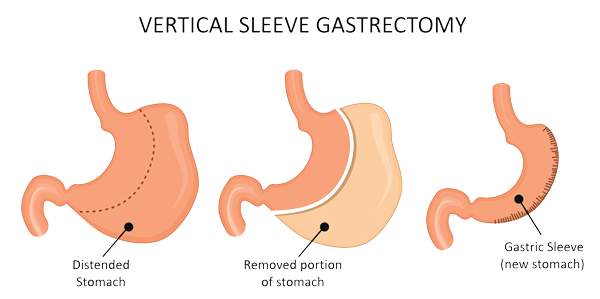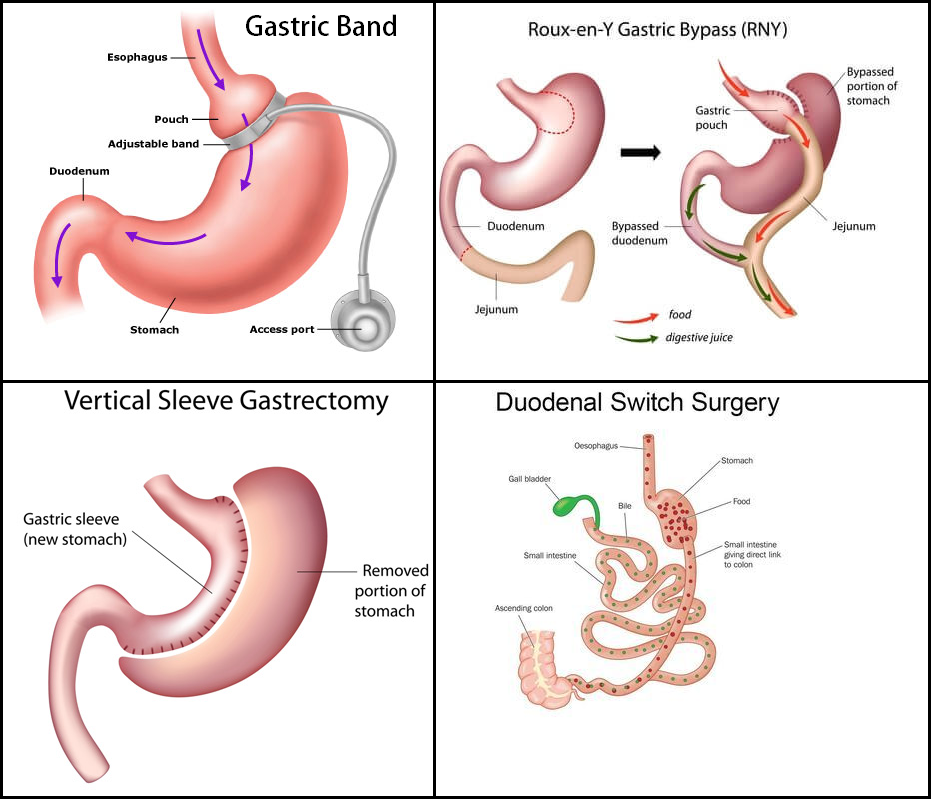Are you struggling to lose weight despite trying countless diets and exercises? Bariatric surgery for weight loss might be the solution you’ve been searching for.
This procedure isn’t just about shrinking your stomach—it’s about transforming your health and your life. Imagine feeling lighter, more energetic, and confident every day. You’ll discover exactly what bariatric surgery is, how it works, and whether it could be the right choice for you.
Keep reading to learn how this option can help you take control of your weight and reclaim your well-being.

Bariatric Surgery Types
Bariatric surgery helps people lose weight by changing the digestive system. It limits how much food the stomach holds or reduces nutrient absorption.
There are different types of bariatric surgery. Each works in a unique way to support weight loss and improve health.
Gastric Bypass
Gastric bypass surgery makes the stomach smaller. It also changes the small intestine path to reduce calorie absorption.
This surgery helps people eat less and absorb fewer calories. It often leads to fast and significant weight loss.
Sleeve Gastrectomy
Sleeve gastrectomy removes a large part of the stomach. The remaining stomach is shaped like a sleeve or tube.
This smaller stomach limits food intake. It also lowers hunger by reducing hormone production.
Adjustable Gastric Band
An adjustable gastric band is a silicone band placed around the upper stomach. It creates a small pouch to hold food.
The band can be tightened or loosened to control food flow. This surgery slows eating and reduces hunger.
Biliopancreatic Diversion
Biliopancreatic diversion removes part of the stomach. It also reroutes the intestines to reduce calorie and nutrient absorption.
This surgery causes more weight loss but requires careful vitamin and mineral management.

How Surgery Aids Weight Loss
Bariatric surgery helps people lose weight by changing how their body handles food. It makes it easier to eat less and burn more calories.
The surgery changes the stomach and digestive system. These changes reduce hunger and help control appetite.
Reducing Stomach Size
The surgery makes the stomach smaller. This limits the amount of food a person can eat at one time.
A smaller stomach sends signals to the brain that tell you when you are full. This helps reduce overeating.
- Limits food intake
- Makes you feel full faster
- Reduces calorie consumption
Altering Digestive Process
Some surgeries change how food moves through the digestive system. This affects how nutrients and calories are absorbed.
By bypassing parts of the intestine, fewer calories and fats enter the body. This helps with weight loss.
- Bypasses part of the intestines
- Reduces calorie absorption
- Changes digestion speed
Hormonal Changes
Bariatric surgery affects hormones that control hunger and fullness. These changes help reduce appetite.
Hormones like ghrelin decrease, which lowers hunger. Other hormones increase to improve feelings of fullness and control blood sugar.
- Decreases hunger hormone (ghrelin)
- Increases fullness hormones
- Improves blood sugar control
Benefits Beyond Weight Loss
Bariatric surgery helps people lose weight by making changes to the stomach or intestines. It is not only useful for weight loss but also improves many health problems caused by obesity.
People who have bariatric surgery often see better health in many areas. These benefits help improve their quality of life and overall well-being.
Improved Diabetes Control
Bariatric surgery can lower blood sugar levels in people with type 2 diabetes. It helps the body use insulin better and reduces the need for diabetes medicine.
Many patients see a big drop in their blood sugar soon after surgery, even before much weight loss happens.
Lower Blood Pressure
High blood pressure often improves after bariatric surgery. Losing weight eases the strain on the heart and blood vessels.
This reduces the risk of heart attacks and strokes. Many patients need less blood pressure medicine after surgery.
Enhanced Mobility
Carrying extra weight makes moving and exercising hard. Bariatric surgery helps people move more easily by reducing body weight.
Better mobility allows people to stay active, which improves muscle strength and joint health.
- Walk longer without pain
- Climb stairs more easily
- Enjoy daily activities again
Better Mental Health
Losing weight can boost confidence and reduce feelings of depression. Bariatric surgery often helps improve mood and self-esteem.
Many patients report less anxiety and a better outlook on life after surgery and weight loss.
Who Qualifies For Surgery
Bariatric surgery helps people lose weight by changing the stomach or intestines. Not everyone can have this surgery. Doctors use rules to decide who should get it.
These rules look at body weight, health problems, and mental readiness. Meeting these rules means surgery can be safe and helpful.
Bmi Criteria
BMI means Body Mass Index. It measures if your weight is healthy for your height. Doctors use BMI to check if surgery is needed.
Usually, a person must have a BMI of 40 or higher. This means they are very obese. Some people with a BMI of 35 can qualify if they have health problems.
- BMI 40 or higher without health issues
- BMI 35 to 39.9 with serious health problems
- BMI below 35 usually does not qualify
Health Conditions Considered
Doctors check health problems caused by obesity. These problems can be life-threatening or reduce quality of life.
Health issues may make surgery more urgent and helpful. Surgery can lower risks from these conditions.
- Type 2 diabetes
- High blood pressure
- Severe sleep apnea
- Heart disease
- Joint problems due to weight
Psychological Evaluation
Doctors check mental health before surgery. This helps ensure patients can handle changes after surgery.
The evaluation looks at eating habits, support systems, and ability to follow medical advice. Mental readiness is important for long-term success.
- Check for eating disorders
- Assess stress and coping skills
- Evaluate support from family or friends
- Confirm understanding of surgery risks
Risks And Considerations
Bariatric surgery can help with weight loss but comes with risks. It is important to know what to expect before choosing this option.
Doctors and patients must consider possible complications and lifestyle changes after surgery. Careful planning helps reduce risks.
Surgical Complications
All surgeries carry risks, and bariatric surgery is no different. Problems may happen during or after the operation.
Some common complications include infections, blood clots, and leaks where the stomach was changed. These can cause serious health issues.
- Infections at the surgery site
- Blood clots in legs or lungs
- Leaks from stomach or intestines
- Breathing problems during recovery
- Need for follow-up surgeries
Nutritional Deficiencies
Bariatric surgery changes how your body absorbs food. This can lead to missing important vitamins and minerals.
Patients must take supplements and follow diet plans to avoid problems like anemia or weak bones.
- Low iron causing anemia
- Vitamin B12 deficiency leading to fatigue
- Calcium loss weakening bones
- Vitamin D shortage affecting health
- Need for lifelong vitamin supplements
Lifestyle Changes Required
After surgery, patients must change how they eat and live. These changes help keep weight off and stay healthy.
Eating smaller meals, avoiding certain foods, and regular exercise become important parts of life.
- Eat small, frequent meals
- Focus on protein-rich foods
- Avoid high-sugar and fatty foods
- Drink plenty of water, but not with meals
- Exercise regularly to maintain weight loss
- Attend follow-up doctor visits
Preparing For Surgery
Getting ready for bariatric surgery takes careful planning. It helps your body handle the surgery better.
Doctors and staff will guide you through steps to prepare physically and mentally.
Medical Assessments
Your doctor will check your health before surgery. This includes blood tests and heart exams.
They look for any problems that may affect the surgery or recovery.
- Blood pressure check
- Blood sugar level test
- Heart and lung function tests
- Psychological evaluation
Dietary Adjustments
You will need to change your diet before surgery. This helps shrink the liver and ease the operation.
Doctors often suggest a high-protein, low-carb diet for a few weeks.
- Eat lean proteins like chicken and fish
- Limit sugars and fatty foods
- Drink plenty of water
- Avoid large meals
Support Systems
Having support is important before and after surgery. Family and friends can help with daily tasks.
You may also join support groups to share experiences and get advice.
- Talk with family about your surgery plan
- Find local or online support groups
- Meet with counselors or therapists
- Prepare for help during recovery
Life After Surgery
Bariatric surgery changes how your body handles food. Life after surgery needs new habits and care.
Following guidelines helps keep weight off and stay healthy for a long time.
Diet And Exercise
Your diet will change a lot after surgery. You will eat smaller meals and focus on healthy foods.
Exercise helps your body stay strong and burn calories. Start slow and build up over time.
- Eat protein-rich foods to heal and stay full
- Drink plenty of water but avoid drinking with meals
- Limit sugary and fatty foods to prevent weight gain
- Walk daily and add light exercises as you improve
Follow-up Care
You will have regular doctor visits after surgery. These help track your health and progress.
Doctors check your vitamin levels and weight. They adjust your plan if needed to keep you safe.
- Attend all scheduled follow-ups
- Get blood tests to check nutrition
- Report any problems like pain or nausea
- Ask questions about your new diet and lifestyle
Long-term Success Tips
Keeping weight off needs good habits for life. Stay patient and keep your goals in mind.
Stay connected with support groups or counselors. They help you stay motivated and handle challenges.
- Plan meals and track what you eat
- Exercise regularly to maintain fitness
- Take vitamins as your doctor advises
- Seek help if you feel stressed or lose motivation

Frequently Asked Questions
What Is Bariatric Surgery For Weight Loss?
Bariatric surgery is a medical procedure that helps reduce body weight. It alters the digestive system to limit food intake or absorption. This surgery is for people with severe obesity who need effective, long-term weight loss solutions. It improves health and quality of life.
Who Is Eligible For Bariatric Surgery?
Candidates typically have a BMI of 40 or higher or 35 with obesity-related health issues. They must try other weight loss methods first. Doctors also assess overall health and willingness to follow lifestyle changes after surgery to ensure success and safety.
How Does Bariatric Surgery Promote Weight Loss?
The surgery reduces stomach size or reroutes intestines, limiting food intake and nutrient absorption. This causes early fullness and fewer calories absorbed, leading to weight loss. It also affects hunger hormones, reducing appetite naturally. These changes support sustained weight reduction.
What Are Common Types Of Bariatric Surgery?
Popular types include gastric bypass, sleeve gastrectomy, and adjustable gastric banding. Gastric bypass reroutes the small intestine. Sleeve gastrectomy removes part of the stomach. Gastric banding places a band to reduce stomach size. Each has specific benefits and risks.
Conclusion
Bariatric surgery helps many people lose weight safely and effectively. It changes the stomach or digestive system to limit food intake. This surgery is not a quick fix but a tool to support healthy habits. Patients must follow diet and exercise plans after the surgery.
Doctors carefully check if someone is a good candidate. Understanding the benefits and risks is important before deciding. Bariatric surgery offers hope for those struggling with obesity. It can improve health and quality of life with the right care.



